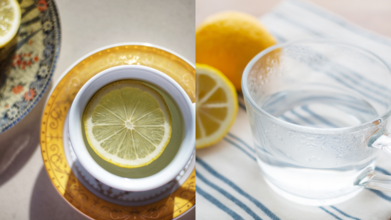- Health Conditions A-Z
- Health & Wellness
- Nutrition
- Fitness
- Health News
- Ayurveda
- Videos
- Medicine A-Z
- Parenting
- Web Stories
Giardia Infection from the Well: Doctor Warns Against Drinking Water Straight from ‘Natural’ Sources

For one unlucky traveller, that picture-perfect getaway turned into weeks of misery after he suffered chronic diarrhoea and unexplained weight loss. Upon diagnosis, it was found that he had a Giardia infection due to drinking unfiltered well water. It is a case shared by gastroenterologist Dr Saurabh Sethi, known as doctor.sethi on Instagram, who treated the patient. And he is sounding the alarm, loud and clear, that even the most pristine-looking water sources can be teeming with microscopic parasites.
Giardia is actually a gut-wrecking parasite, common in untreated water like wells, lakes, streams, and even resort town taps. If water has even a trace of contamination, Giardia can wreak havoc in your gut. The parasite flattens the lining of your gut, wrecking your ability to absorb nutrients and leaving you weak, dehydrated, and with loose stools.
Clear water does not equal safe water, especially when it comes to what you drink. Even the crystal-clear mountain spring could be having parasites.
Filter It, Boil It, But Never Drink It Straight
Dr Sethi’s takeaway is simple but critical: always filter or boil well water, no matter how clean it looks. A portable water filter, boiling for at least a minute, or using chlorine or iodine tablets can all kill off lurking pathogens.
For those using well water regularly at home, proper testing and a reliable filtration system are must-haves. Annual checks for bacteria, nitrates, and parasites are boring but essential. And if you are travelling, pack smart. A tiny filter straw or water-purifying tablets can be the difference between a peaceful trip and parasitic mayhem.
Your Gut Deserves Better
The gut is more than just a food tube; it handles your immune system, your nutrient factory, and your second brain. Trashing it with contaminated water is not the safest thing to do.
Heart Attacks And Strokes Can Now Be Predicted 10 Years Before They Happen, Through This AI Test

(Credit-Canva)
Cardiovascular health is one of the leading causes of deaths all over the world. The Centers of Disease Control and Prevention states that every 34 seconds a person dies from cardiovascular disease (CVDs). Statistics show 919,032 deaths due to CVDs in the US in 2023. Globally the number is even bigger, hence why people are advised to take better care of their health, whether it is in terms of food, exercise or mental health.
A big reason why we have been able to proactively avoid heart issues is because of the advancement in medicine through tests and research. These findings have helped us stay healthy and avoid issues in the future. Another such aid has been made through a recent study, which could predict heart events years before it even happens.
A recent study done by the British Heart Foundation, suggest that a quick eye test, taking less than a minute, might be able to predict your risk of having a heart attack or stroke in the next ten years. Scientists have developed an advanced computer system that analyzes digital pictures of the back of your eye. This technology can quickly provide a personalized assessment of your risk. The hope is that this simple and easy test could become a regular part of health check-ups, just like measuring blood pressure or cholesterol, helping doctors spot potential problems as early as possible.
Peering into the Eye's Blood Vessels
This new technology uses the idea that the tiny blood vessels in your eyes can give important clues about the health of blood vessels throughout your entire body. This includes the ones that supply your heart and brain. It might seem surprising, but specialists say that your eyes are like a "window to your heart." If there's any damage or narrowing in the blood vessels at the back of your eye, it's likely that similar issues are happening in the blood vessels deeper inside your body, which could eventually lead to a heart attack or stroke.
Learning from Diabetic Eye Scans
Researchers taught this advanced computer system using eye scans from people who have type 2 diabetes. These individuals regularly have their eyes checked for a condition called diabetic retinopathy, where high blood sugar can harm the blood vessels in the retina. The system was first taught to recognize potential warning signs in these images, such as narrowed or blocked blood vessels. Then, it was allowed to examine every tiny detail within the pictures, including the size or shape of blood vessels, and was trained using a large collection of over 4,000 images.
Accurately Predicting Cardiovascular Events
The AI technology was quite successful in predicting which individuals would experience serious heart problems, like heart attacks or strokes, within a decade. It was accurate about 70% of the time. Experts point out that this is a single, quick scan that is already done routinely and takes less than a minute. They believe it could become a very important part of overall health checks, alongside blood pressure and cholesterol tests, to help identify people who could benefit from medications or changes to their lifestyle.
Game-Changer for Heart Health
Leaders in the field emphasize that the more precisely we can figure out someone's risk of a heart attack or stroke, the better we can prevent these events from happening. They see innovative advancements like using eye scans alongside other health checks as a key way to improve how we predict risk. This is very important if we want to reach the goal of preventing a significant number of heart attacks and strokes in the future.
Experts also suggest that such advances could make it much easier for people at risk of stroke to take the necessary steps to prevent it. While there are still many practical questions about how and when this AI could be used in regular medical care, there's hope that future health plans will consider these technological advancements to save more lives.
The Itchy Truth About Pads and Tampons: What Your Period Products Are Not Telling You

For something that’s supposed to be a monthly saviour, your sanitary pad could actually be a trouble in disguise. If you’ve ever spent your period feeling itchy, sore, or just...off, you’re not imagining it. According to gynaecologist Dr Vaidehi Marathe, many conventional pads and tampons contain elements that don’t quite agree with your body.
Itchiness is a common complaint during menstruation, but most people blame sweat, heat, or hormones. The real problem, says Dr Marathe, might be your pad itself. Many commercial pads are loaded with synthetic materials, added fragrances, and chemical adhesives that can irritate the delicate skin in your intimate area. That persistent itch could be your body’s way of saying, please get this thing off me.
Rashes, roughness, and friction
It doesn’t end with itching. If you’ve ever developed a rash down there during your period, Dr Marathe says your pad’s texture or material could be behind it. "Poor-quality materials or excessive friction can cause chafing, redness, and irritation," she says in an Instagram video.
Even tampons, which many prefer for comfort and convenience, aren’t totally innocent. High-absorbency varieties are known to dry out the vaginal lining, leading to discomfort and even micro-tears. Dr Marathe warns that such dryness disturbs the natural balance of the vaginal mucosa, and that’s when things can start to get really unpleasant.
That smell isn’t just your period
While menstruation has a natural odour, a strange or strong scent often comes from bacterial buildup, not your body. Pads, especially the non-breathable kind, can trap moisture and create a breeding ground for bacteria. Dr Marathe points out that the odour is often caused by bacteria thriving in that warm, moist environment.
Healthier swaps
You don’t have to suffer for the sake of convenience. Look beyond the supermarket aisle. Cloth pads, menstrual cups, and period underwear are all gentler options that are free of harmful chemicals and better for your skin and the environment. They allow the area to breathe and are less likely to cause irritation or dryness.
Menstrual cups in particular have gained popularity for being economical, eco-friendly, and surprisingly comfortable once you get the hang of them.
Your period deserves better
Periods are already uncomfortable enough without adding allergic reactions, rashes, or infections to the mix. If you’re constantly battling irritation or feeling ‘off’ during your cycle, it’s worth examining what’s coming into contact with your skin for hours at a stretch.
What Happens When You Drink Lemon Water for 30 Days?

Many people start their day with a glass of lemon water, hoping for a range of health benefits—from better skin to improved digestion. But what actually happens when you stick to this habit every day for a month? According to gastroenterologist Dr Saurabh Sethi, lemon water can offer some real advantages, as long as you are aware of a few important points.
Lemons Pack a Big Punch
Lemons are packed with more than 30 beneficial plant compounds, says Dr Sethi. These include antioxidants and anti-inflammatory agents that support your body's daily housekeeping on a cellular level.
But freshly squeezed is important. “Pasteurised lemon juice often loses a significant portion of its nutritional value,” Dr Sethi explains.
Absorption Gets a Boost
While you are sipping away, thinking you are just hydrating enough, something pretty important is happening in the background. The natural acidity of lemons can help your body absorb minerals more effectively, particularly iron, according to Dr Sethi. That means your morning lemon ritual might be giving your iron supplements or spinach salads a bit of extra firepower.
And lemon water does not magically "alkalise" your body. But what it does do is help your digestive system set the stage for better nutrient uptake.
Skin Goals and Collagen Dreams
If you are secretly hoping for that elusive “glow-up” by day 30, you might be in luck. Lemons are a great source of vitamin C, a key player in the production of collagen, the protein responsible for keeping your skin firm, your joints cushioned, and your connective tissues in top shape.
Dr Sethi says that daily lemon water may support healthier skin from the inside out. Think of it as your internal skincare serum.
The Bitter Truth
As Dr Sethi points out, lemon water might not be ideal for everyone, especially those with acid reflux or sensitive stomachs. The very same acidity that helps with mineral absorption can irritate the oesophagus lining or worsen heartburn in susceptible folks. If you have ever felt that familiar burn after a glass of lemony water, your body is throwing a sign.
© 2024 Bennett, Coleman & Company Limited

